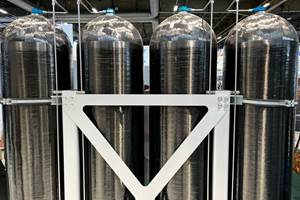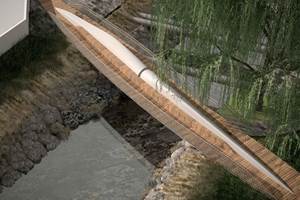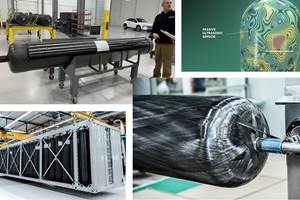FACC seeks 200 new hires in IT, digitalization, innovation and automation
Upswing in aviation, including 2021 new contracts worth €1 billion, impels FACC investment of €150 million to support short-cycle processing of lightweight composites, recycling and expanded production via automation and next-gen manufacturing technologies.
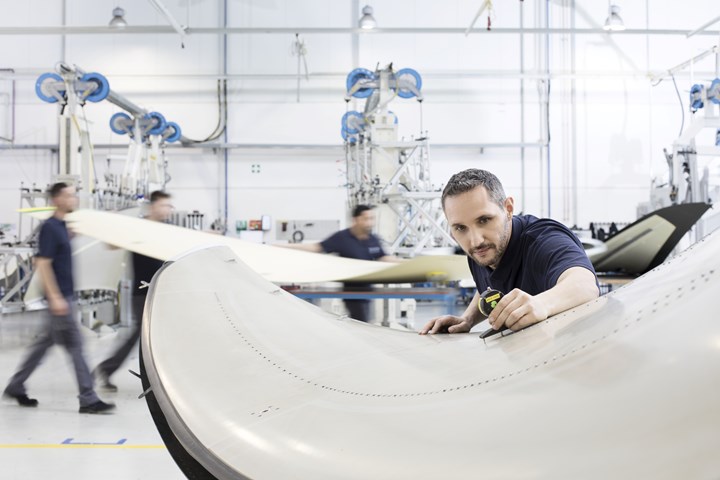
Winglet production. Photo Credit, all images: FACC AG
The international aerospace group FACC AG (Ried im Innkreis, Austria) is harnessing the positive developments in the global aircraft market for its own systematic growth; according to FACC, demand is on the rise, and a noticeable increase in sales is on the horizon for 2022. Consequentially, the high-tech group is adding more than 200 new employees to its workforce and launching an investment initiative totaling €150 million (~$172 million).
The aviation industry is currently experiencing an upswing — airlines are starting to expand their fleets again, FACC says, and the positive industry trend is significantly stronger in some areas than recently forecast. FACC is consistently taking advantage of these opportunities. The aerospace company, which boasts aircraft manufacturers such as Airbus (Toulouse, France), Boeing (Chicago, Ill., U.S.), Embraer (São Paulo, Brazil), Bombardier (Montreal, Canada), Rolls Royce (London, U.K.) and Pratt & Whitney (Hartford, Conn., U.S.) among its customers, expects significant sales growth in 2022, and is pursuing a consistent expansion strategy for the coming years.
“Last year alone [2021], we were able to secure new contracts worth more than €1 billion,” reports Robert Machtlinger, CEO of FACC AG. “We are also focusing on a long-term growth strategy for the future, and are now launching an employment and investment initiative.”
One such initiative includes FACC’s hiring of more than 200 new employees at its Upper Austrian locations. The focus of the newly created jobs is production. The company seeks to fill vacancies in the areas of IT, digitalization, innovation management and automation, with recruitment already underway.
In addition, FACC has agreed on a comprehensive investment package for the next five years. A total of €150 million (~$172 million) are to be invested in the following three areas:
New projects
- In 2021, FACC was awarded a contract for the European Ariane 6 space program. A potential first application of the lightweight innovation is the HERA project for planetary asteroid defense technology. The goal is to test the extent to which an asteroid can be deflected from its trajectory by means of two comets passing by Earth.
- Airbus has commissioned FACC with the production of the empennage components for the A220, thereby sustainably strengthening the close cooperation spanning decades. FACC is the sole supplier of the rudder and elevator for the A220.
- FACC has developed a state-of-the-art business jet cabin for the Canadian aircraft manufacturer Bombardier. The production of the cabin interior for the Bombardier Challenger 3500 constitutes a major project for the coming years.
Strong expansion of research and development (R&D) for consistent sustainability and increasing competitive strength
FACC says it is working intensively on new materials and production technologies. Here, two major goals go hand in hand: consistent sustainability and steadily increasing competitive strength:
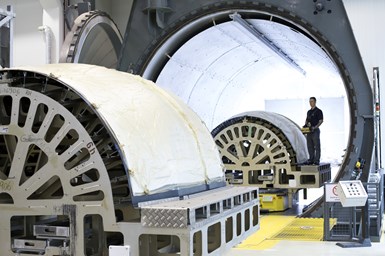
- FACC is intensively researching new lightweight materials and their processing methods. These so-called composites offer several advantages at once: They are resistant and durable, boast a long life cycle and save fuel and thus CO2 in flight operations due to their low weight. The company is also taking systematic steps to innovate and improve the manufacturing process, focusing in particular on reducing the curing time of parts. This saves energy while cutting CO2 emissions.
- The recyclability of components will constitute a further R&D focus in the coming years; chemical product components are to be replaced by biological substances, for instance, from the sugar cane industry.
- Through the development of additional high-performance automation technologies, FACC continues to drive forward the industrial production of lightweight construction systems for aircraft. The goal is to reduce throughput times, cut manufacturing costs and consume less energy.
- As part of its investment initiative, FACC will also be intensifying and expanding its collaborative research with leading companies in the aircraft industry, for instance the Airbus Wing of Tomorrow program.
Expansion of production facilities
In the past year, FACC concluded contracts in excess of €1 billion with its customers. To equip itself for the future, the aviation group will be expanding its production facilities with next-generation technology and building new, highly automated plants.
With its recently launched employment and investment initiative, FACC is taking clear steps towards sustained growth in the coming years. By 2030, FACC aims to establish itself among the top 50 aerospace groups worldwide; it is currently among the top 100. “Committed to the sky — at all levels” is the order of the day.
Related Content
Natural fiber composites: Growing to fit sustainability needs
Led by global and industry-wide sustainability goals, commercial interest in flax and hemp fiber-reinforced composites grows into higher-performance, higher-volume applications.
Read MoreRecycling hydrogen tanks to produce automotive structural components
Voith Composites and partners develop recycling solutions for hydrogen storage tanks and manufacturing methods to produce automotive parts from the recycled materials.
Read MoreRecycling end-of-life composite parts: New methods, markets
From infrastructure solutions to consumer products, Polish recycler Anmet and Netherlands-based researchers are developing new methods for repurposing wind turbine blades and other composite parts.
Read MoreHexagon Purus Westminster: Experience, growth, new developments in hydrogen storage
Hexagon Purus scales production of Type 4 composite tanks, discusses growth, recyclability, sensors and carbon fiber supply and sustainability.
Read MoreRead Next
Developing bonded composite repair for ships, offshore units
Bureau Veritas and industry partners issue guidelines and pave the way for certification via StrengthBond Offshore project.
Read More“Structured air” TPS safeguards composite structures
Powered by an 85% air/15% pure polyimide aerogel, Blueshift’s novel material system protects structures during transient thermal events from -200°C to beyond 2400°C for rockets, battery boxes and more.
Read MorePlant tour: Daher Shap’in TechCenter and composites production plant, Saint-Aignan-de-Grandlieu, France
Co-located R&D and production advance OOA thermosets, thermoplastics, welding, recycling and digital technologies for faster processing and certification of lighter, more sustainable composites.
Read More



















